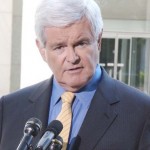As the Newt Turns
 Newt Gingrich’s campaign for president took a hard, hard punch this week, after Esquire published a profile of Gingrich spiced up by quotations from his second wife.
Newt Gingrich’s campaign for president took a hard, hard punch this week, after Esquire published a profile of Gingrich spiced up by quotations from his second wife.
Newt Gingrich’s campaign for the U.S. presidency just took a hard, hard punch.
This week, Esquire magazine published a profile of Gingrich spiced up by quotations from Gingrich’s second wife, Marianne.
The material that has Washington buzzing (reproduced in the paragraph below) refers to events in the fall of 1998: Gingrich’s Republicans have just taken an unexpected beating in the spring mid-terms, and would soon impeach Bill Clinton for lying under oath about his affair with Monica Lewinsky. Marianne has just been diagnosed with multiple sclerosis — and soon afterward learns that Newt has been conducting an affair with one of his congressional aides, who has been living in the Gingrichs’ apartment during Marianne’s absences.
“[Gingrich] had just returned from Erie, Pennsylvania, where he’d given a speech full of high sentiments about compassion and family values. The next night, they sat talking out on their back patio in Georgia. She said, ‘How do you give that speech and do what you’re doing?’ ‘It doesn’t matter what I do,’ he answered. ‘People need to hear what I have to say. There’s no one else who can say what I can say. It doesn’t matter what I live.’ ”
As the 2012 presidential cycle has neared, Newt Gingrich has transformed himself into a man of faith. He married the congressional aide for whom he left Marianne. He converted to Roman Catholicism. Interviewed on evangelical leader James Dobson’s radio program, Gingrich announced that he had sought God’s forgiveness for past transgressions “on his knees.”
He has written a book about “rediscovering God,” and produced with his new wife a movie about the life of John Paul II. When asked about his presidential ambitions, he answers: “It’s up to God and the American people.”
In the 2005-2009 period, Gingrich experimented with post-partisan elder statesmanship: making joint appearances with Hillary Clinton and Al Sharpton, even urging Republicans to “collaborate” on healthcare reform with a newly elected President Obama. Gingrich endorsed the bank bailouts of 2008, and has in the past said favorable things about government support for high-speed rail, alternative energy, and the commercialization of space.
Now the former post-partisan has resumed the hyper-partisanship that won a congressional majority in 1994. He now regularly denounces the Democratic party’s “secular socialist machine.”
No more high-speed rail for him: Government activism is socialism, full stop. Nor will he accept the fate of Rudy Giuliani in 2008: He will join the religious conservatives who dominate the Iowa caucuses, not try to beat them.
Gingrich has made a career out of clever tactics and abrupt reversals. He took up environmental concerns in his (co-authored) 2007 book, A Contract with the Earth, then dropped them again in his 2008 pamphlet, Drill Here, Drill Now, Pay Less.
But even the nimblest politician takes a risk with every about-face, and the Esquire article drives home one of the biggest risks that Gingrich faces. America’s most religious voters may accept and appreciate narratives of sin, repentance, and redemption. But some religious voters may see hypocrisy rather than redemption in Gingrich’s personal story.
Marianne again: “I used to tell him I don’t care if you lose Congress as long as you’re standing for what you believe in and what we’ve worked for — as long as you don’t sell out. But he wanted the life he wanted. You can call it opulent. You can call it self-indulgent. You can call it anything you want to. But that’s not me.”
Divorced men have won party nominations before: Ronald Reagan in 1980, John McCain in 2008. In both cases, the ex-wives communicated that they would be voting for their former mate. (At Reagan’s death, Jane Wyman said: “America has lost a great president, and a great, kind and gentle man.)
A divorced candidate with a bitter ex-spouse will be a very different kind of first — and a very different kind of hurdle to overcome.
Originally published in the National Post.